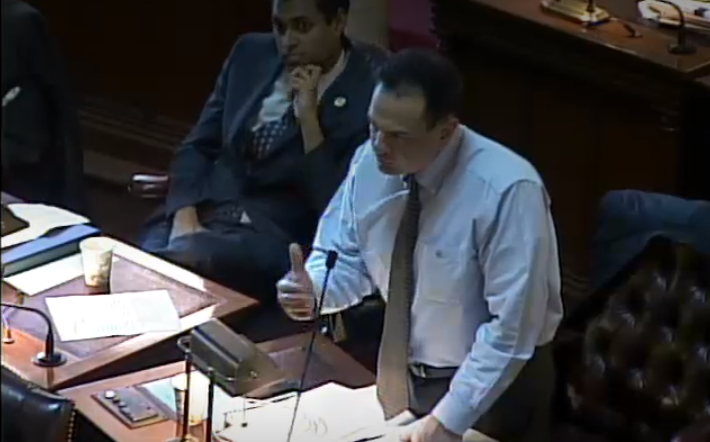ELEC Welcomes Debate Over Pending Campaign Finance Reform Bill

State Senator Nicholas Scutari (D-22) has introduced legislation (S-3413) that would require disclosure of campaign finance activity within 72 hours of its occurrence.
This “real time” disclosure requires candidates, party committees, and PACs to report donations over $200 as well as the expenditures they make within this three-day period.
The legislation also would remove all contribution limits, end quarterly reporting, and presumably require the Election Law Enforcement Commission (ELEC) to post that same information on an ongoing basis within 72 hours of receipt.
The effort by Senator Scutari to modernize the State’s campaign finance system by making disclosure quicker and addressing other critical areas hopefully will bring about serious discussion and perhaps even action.
I must acknowledge one thing up front. The Commission to date has never recommended removing contributions limits that were first imposed in New Jersey in 1993 on non-gubernatorial candidates and committees.
For many years, however, it has proposed raising them to offset the lost purchasing power caused by inflation.
Political donations to non-gubernatorial candidates, parties, and PACs have not been revised since 2005, with no inflation adjustments for more than 16 years.
Non-gubernatorial candidates such as legislators and mayors, for instance, still can only accept checks up to $2,600 per election from individuals, corporations, or associations.
Donations to municipal party committees are frozen at $7,200 per year. The same $7,200 limit applies to continuing political committees, better known as PACs.
By contrast, contributions limits for gubernatorial candidates are updated every four years since those candidates are eligible for public funds if they can raise enough money from private donors.
Gubernatorial candidates in 2005 were able to accept $3,000 per election. This year, the contribution limit is $4,900- a 63 percent increase.
The same statute that requires ELEC to revise gubernatorial contribution limits every four years also requires ELEC to recommend increases for other candidates and committees. But since 2005, the Legislature has left in place the non-gubernatorial donation caps.
Making matters worse, no limits apply to contributions made to independent, “Dark Money” groups. This dichotomy has helped cause a major imbalance within the State’s electoral system.
Since the mid-2000s, independent groups have steadily grown more influential, spending tens of millions in recent gubernatorial and legislative elections. During the same period, political parties at all levels have been fading significantly.
When contribution limits were first imposed in 1993 on non-gubernatorial candidates, the state also enacted a unique campaign cost index into law. The index accounted for campaign inflation over the four-year period from 1989 to 1993.
It has been applied to gubernatorial elections ever since by factoring in inflation every four years.
The law helped save the Gubernatorial Public Financing Program. It was headed for oblivion in the 1980s when concern arose that candidates would think twice about accepting public funds if they had to keep operating under the same, fixed contribution limits every election. Quadrennial adjustments removed that disincentive.
Initially, the campaign cost index also was applied to non-gubernatorial candidates and party committees, with contribution limits raised for inflation consistent with that same four-year period between gubernatorial elections.
Unfortunately, effective in 2005, a new law froze the limits that applied to non-gubernatorial candidates. These limits have now been stagnant for 16 years even though inflation has not gone away.
Now more than ever, we need to raise contribution limits for non-gubernatorial candidates and parties, and once again make them subject to the campaign cost index adjuster every four-years.
These steps would go far toward enhancing the viability of the State’s electoral system, just as use of the campaign cost index helped preserve the gubernatorial public finance program.
The Commission has advanced a broad set of recommendations for strengthening the State’s electoral system, foremost among them strengthening political parties and requiring disclosure of contributions and expenditures by independent, “Dark Money” groups that engage in election-related activity.
Among those proposals: raising contribution limits applying to donations to political parties and candidates; removing political parties from pay-to-play laws while including PACs under them; allowing state parties to participate in gubernatorial elections; and requiring contractor donations to independent groups to be disclosed.
Personally, I also believe tax credits should be made available to encourage for contributions to political parties.
It must be noted as well that should the Legislature move to adopt a 72-hour reporting system, ELEC will need additional funds to revamp its website and reprogram its internal computer operations.
These reforms would help restore balance to the electoral system between independent groups, candidates and parties, something that is a critical need in light of the growing dominance of independent groups.
Hopefully, the meritorious efforts of Senator Scutari to try to modernize the State’s campaign finance statutes will draw attention to the issue and result in major campaign finance reform that will make the system more transparent and accountable.
Strengthening political parties to offset the increased influence of independent groups along with adjusting non-gubernatorial limits would go far toward improving an already sound campaign finance system in the Garden State.
Jeff Brindle is the Executive Director of the New Jersey Election Law Enforcement Commission. The opinions presented here are his own and not necessarily those of the Commission.









Leave a Reply